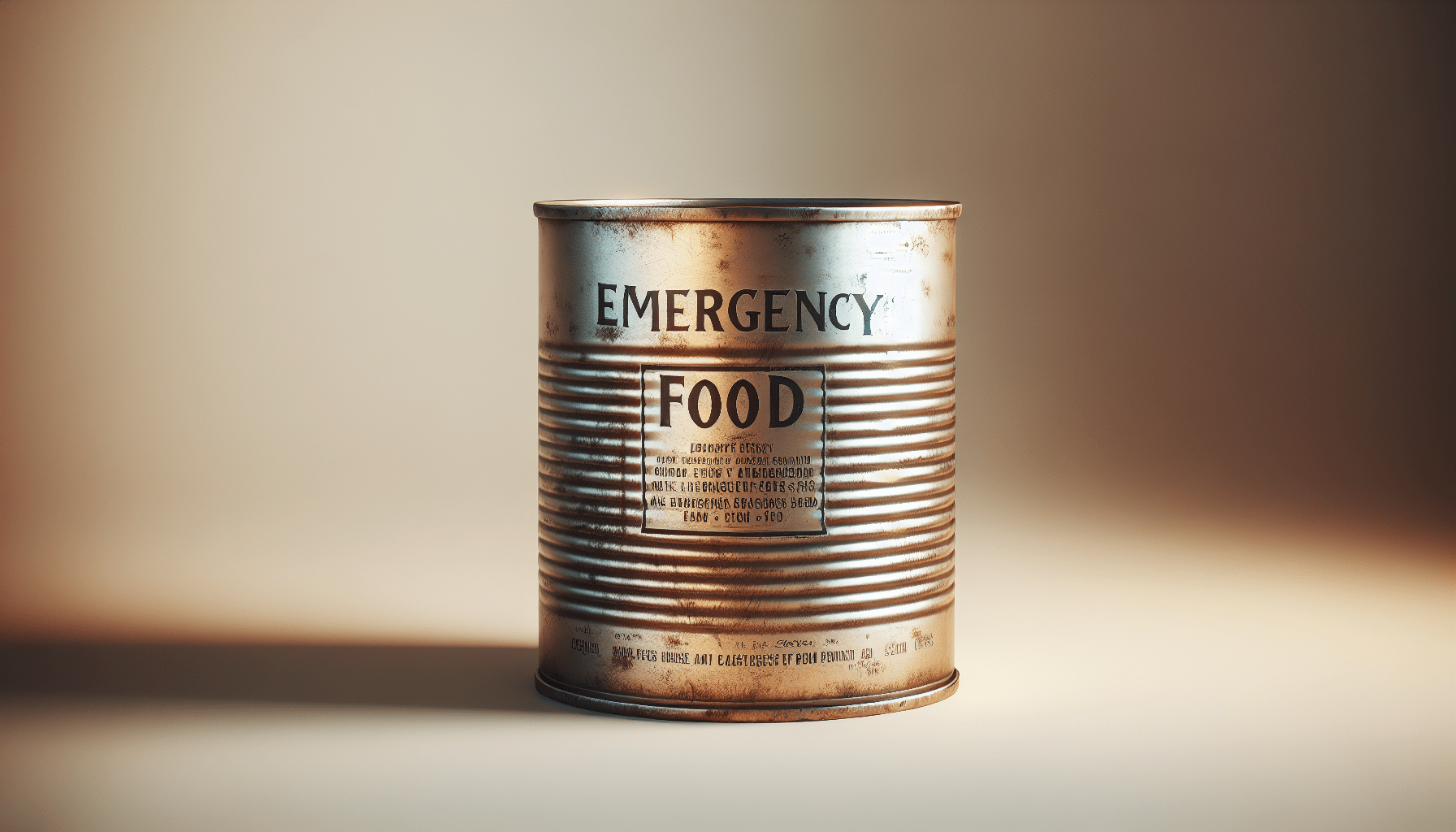Have you ever found yourself staring at a can of emergency food in your pantry, noticing its expiration date has long passed? Suddenly, you might find yourself questioning whether it’s still safe to eat and if there’s any risk involved. In times of disaster or emergency, having a stockpile of food is crucial, but understanding the implications of expiration dates is equally important.

Understanding Expiration Dates
Expiration dates on food products can often be a source of confusion. The language used—like “best by,” “use by,” and “sell by”—isn’t always straightforward. Expiration dates don’t necessarily mean the food is unsafe to eat; instead, they often signal when a product is at its peak quality.
Best By vs Use By
The terms “best by” and “use by” essentially indicate the manufacturer’s estimation of the period during which the product maintains its best quality. If you’ve got a package labeled with a “best by” date, it doesn’t automatically imply that the food will turn bad right after this date.
Sell By
“Sell by” is more of an instruction for the retailer than for the consumer. It signifies the last date an item should be sold to guarantee peak freshness, but you can still consume it safely after this date if it’s been stored correctly.
Factors Affecting Emergency Food Longevity
Packaging
The type of packaging is crucial as it affects the shelf life of emergency food. Airtight packaging, such as vacuum-sealed bags or cans, generally helps prolong a product’s life by minimizing exposure to air and moisture, both of which accelerate food degradation.
Storage Conditions
Storing food in cool, dark, and dry places significantly increases its longevity. Extreme temperatures, humidity, and exposure to light can lead to quicker spoilage or reductions in quality.
Ingredients and Preservatives
Some food items contain preservatives that can extend their shelf life. Knowing which emergency food items include preservatives can help you better judge their usability past the expiration date.
Potential Risks of Consuming Expired Emergency Food
Nutritional Degradation
One primary concern with expired food is that it may lose nutritional value over time. Vitamins, particularly those like vitamin C and some B vitamins, can degrade. Eating expired food might mean you’re not getting the nutrition you originally expected.
Taste and Texture
Another change you’d possibly notice is in taste or texture. So while the food might be safe to eat, it could taste less appealing, and the consistency might not be what you’re used to.
Potential for Contamination
The most significant risk with expired food is potential contamination. While spoilage bacteria can cause food to smell or taste bad, harmful pathogens can lead to severe foodborne illnesses without any detectable change in the food’s smell or taste.
How to Assess If Expired Food Is Safe to Eat
Smell Test
Rely on your senses. If the smell is off or it’s distinctly different from what you’re used to, it’s better to err on the side of caution and avoid consuming it.
Visual Inspection
Look for any visible signs of spoilage—such as mold, discoloration, or an unusual texture. This can help you determine whether the food is still safe to eat.
Tasting Carefully
If the food passes the smell and visual test, try tasting a small amount. If it tastes funny or off, it’s best not to eat it.

Emergency Food Types and Their Longevity
Here’s a breakdown of common emergency food types and their typical shelf lives:
| Type of Food | Average Shelf Life |
|---|---|
| Canned Goods | 2-5 years (or more) |
| Dehydrated Foods | 15-20 years |
| Freeze-Dried Foods | 25-30 years |
| MREs (Meals Ready-to-Eat) | 3-10 years |
Canned Goods
Canned goods have a long shelf life and can often be safe beyond their expiration date if stored properly. However, it’s crucial to check for any dents or rust on the cans, as these can compromise the seal and the food inside.
Dehydrated and Freeze-Dried Foods
These are often packaged in a way to achieve maximum longevity, and they typically don’t have issues with spoilage if the packaging remains intact.
MREs
Although MREs have a shorter shelf life compared to other emergency foods, their packaging is designed to resist harsh conditions. They come with their challenges, however, like potential changes in flavor and nutritional content over time.
Legal Considerations and Liability
Manufacturer Guidelines
While most manufacturers emphasize safety even after the expiration date, they don’t take responsibility for the food quality or potential health risks beyond this period.
Food Safety Regulations
In many regions, food safety regulations prevent retailers from selling expired goods, but they don’t outright ban you from eating them. It boils down to personal responsibility for one’s health.

Strategies to Preserve Emergency Food Quality
Rotating Stock
Regularly rotating your stock ensures you consume the oldest items first, minimizing waste and the chances of spoiled food.
Proper Storage Techniques
Utilize airtight containers and storage with controlled environments to limit exposure to elements that might accelerate spoilage.
Regular Inspections
Periodic checks of your emergency stockpile help identify any items needing replacement or any storage issues you need to address.
Alternatives to Expired Emergency Food
Fresh Food
Maintaining a fresh food supply, even during emergencies, can help supplement your expired stock and ensure nutritional needs are met.
Home Canning and Preserving
Consider learning preservation techniques like canning, which can help retain your food supply’s quality and lengthen its usability.

Final Considerations on Eating Expired Emergency Food
Knowing when and how to use expired emergency food can make a real difference during emergencies. It’s always best to stay prepared by keeping your pantry well-organized and ensuring you have fresh stock when possible. Your health and safety should always be the top priority; when in doubt, it’s safer to avoid consuming expired food items, particularly if you suspect contamination.
By understanding the factors that affect food longevity and utilizing safe practices, you can ensure that your emergency food remains a reliable resource when you need it most. So, next time you’re reaching for that can with a dubious date stamp, you’ll be better equipped to decide if it’s safe for consumption or best left untouched.

